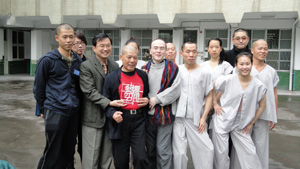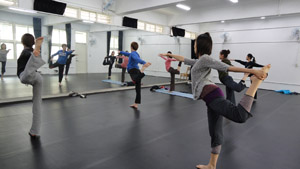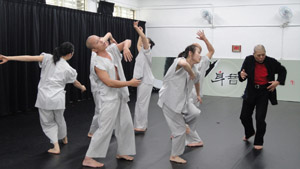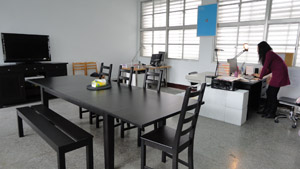No more homeless dance groups with DCA housing program
By Eva Tang In Singapore, the Arts Housing Scheme put into practice in 1985, provides art groups and artists with affordable space. Under the scheme, rental charges are highly subsidized by Singapore’s National Arts Council and maintenance costs are borne by the tenants. Its website says that to date over 90 arts organizations and artists are housed in 43 properties. Across the Pacific Ocean in the U.S., various forms of artists’ housing projects are running in numerous states. For example, an Artist Relocation Program initiated in Paducah of Kentucky State in the year of 2000 lures artists of all kinds to live there with financial and cultural incentives. What started as a move to improve the city’s image turned out to become a way to relocate more than 70 artists and a model of how to build an artists’ community. In Taiwan, Department of Cultural Affairs, Taipei City Government implemented a policy five years ago that provides affordable housing for artist groups. To date, 16 sites accommodate about 50 groups in Taipei. Taipei Dance Circle is one such group. Established in 1984, the troupe moved eight times in the past years, according to its founder Liu Shau-lu. “For 40 years, I’ve been waiting for space for our rehearsals and administrative matters,” he said. One of the founding members of Cloud Gate Dance Theatre, Liu founded his own troupe after dancing with the Theatre for more than a decade. “We were about to disband because we couldn’t find affordable dancing space.” Whenever the Taipei Dance Circle had to relocate, it was most of the time due to landlords who wanted to double the rent. “I think working in the performing arts in Taiwan means having to confront the lack of affordable space to practice,” he said. Taipei Dance Circle now has its own rehearsal room and an office in the former Yi Fang Elementary School, which has been renamed as Xin Beitou Park No.71. Yi Fang merged with another school and moved to a new location in 2007. The following year, the DCA listed its former location among potential sites for art groups and named it after its street. Spread out over an area of 1,989 square meters, the park touts 2 four-story buildings with a total floor space of 3,051 square meters. “Compared to other artists’ housing, Xin Beitou Park No.71 is quite spacious and lies next to residential buildings, so we thought of using it as a space for dance groups who need bigger rooms to practice and are usually quiet in their activities," said Chen. “We approve the applications based on the group’s artistic quality, how badly they need the space, and if they will do public good. If the group is highly commercialized, they’re less likely to get space.” Six dance groups have moved into the Park: Taipei Dance Circle, Body Expression Dance Theater, Ku and Dancers, 8213 Physical Dance Theater, Yubon Theatre and WC Dance. This is the first time that the WC Dance has a place that can be called their own. “We used to share space with my mother’s group (Taipei Folk Dance Theater) until we moved in here, and started practicing two months ago,” said Lin Wen-chung, the artistic director. “I like it here. To get a space like this in Taipei City isn’t easy. It is away from the city center, which is an advantage and disadvantage at the same time.” WC Dance is almost 3 years old. Thirty-seven year old Lin is also the group’s choreographer. He was trained at the National Institute of the Arts (today’s Taipei National University of the Arts), and then at the University of Utah, U.S. He danced with the renowned Bill T Jones / Arnie Zane Company and Repertory Dance Theatre in Utah before coming back to Taiwan to build a dance company of his own. At Xin Beitou Park No.71, monthly rent is NT$1,500 for a 59 square meter room, NT$1,000 for 40 square meters, and only NT$500 for 20 square meters. Plus the cost for water, electricity and tax, the total expense for a month vary from NT$4,500 to NT$14,500, depending on the room size and time spent for rehearsals. Dance groups residing in the Park hold performances as feedback to the local community. Ku’s Dance, Body Expression Dance Theater, and 8213 Physical Dance Theater worked together and joined a dance festival named “Not Dance” last October. Ku’s Dance also plans on holding workshops on ‘contact improvisation’, a dance technique they are known for.
Staff Reporter Older generations often remind their offspring: Don’t become an artist if you want to be rich. Although Andy Warhol may not agree with this, dealing with economic difficulties often confront those who make art their career. More often than not, this is when the public sector steps in to help creative art groups who are usually unfamiliar with the struggle needed to remain financially solvent.
Older generations often remind their offspring: Don’t become an artist if you want to be rich. Although Andy Warhol may not agree with this, dealing with economic difficulties often confront those who make art their career. More often than not, this is when the public sector steps in to help creative art groups who are usually unfamiliar with the struggle needed to remain financially solvent. “Taipei citizens suffer from high real estate prices in the metropolitan area; those in the art and cultural industries especially feel this,” said Chen Kuan-fu, Deputy Director of the DCA, “furthermore, the low birthrate has freed more spaces previously used by some schools and more official residences are unoccupied nowadays. So we rent these out to artist groups who need a home, at reasonable prices.”
“Taipei citizens suffer from high real estate prices in the metropolitan area; those in the art and cultural industries especially feel this,” said Chen Kuan-fu, Deputy Director of the DCA, “furthermore, the low birthrate has freed more spaces previously used by some schools and more official residences are unoccupied nowadays. So we rent these out to artist groups who need a home, at reasonable prices.” After undergoing some renovation, the buildings were opened for application in August 2008 with twelve rehearsal rooms of different sizes.
After undergoing some renovation, the buildings were opened for application in August 2008 with twelve rehearsal rooms of different sizes. “You can call this place an ‘Arcadia’ with few people coming and going; it is not crowded which is good for us because we practice here everyday,” Lin said. “And I heard they will install air conditioning for us soon.”
“You can call this place an ‘Arcadia’ with few people coming and going; it is not crowded which is good for us because we practice here everyday,” Lin said. “And I heard they will install air conditioning for us soon.”

![Taiwan.gov.tw [ open a new window]](/images/egov.png)
